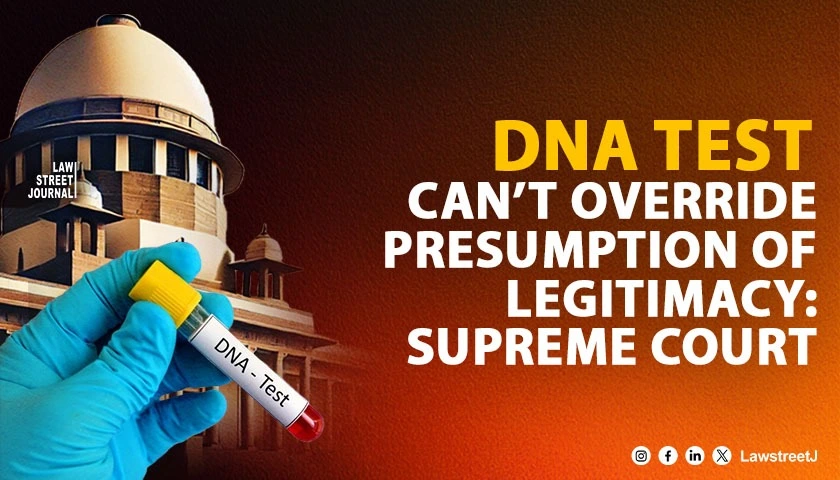New Delhi: In a significant ruling reaffirming the sanctity of the presumption of legitimacy attached to children born within wedlock, the Supreme Court has held that a DNA test cannot be directed as a matter of course to determine paternity, particularly when such a move risks illegitimizing a child and intrudes upon the individual’s right to privacy under Article 21 of the Constitution of India.
A Bench comprising Justice Prashant Kumar Mishra and Justice Vipul M. Pancholi delivered the judgment in R. Rajendran v. Kamar Nisha & Others (Criminal Appeal No. 1013 of 2021), setting aside a Madras High Court order that had compelled the appellant to undergo DNA profiling in a criminal case under Sections 417 and 420 of the Indian Penal Code and Section 4(1) of the Tamil Nadu Women Harassment Act.
The Court observed that Section 112 of the Indian Evidence Act, 1872, creates a conclusive presumption of legitimacy for children born during the continuance of a valid marriage, unless it is shown that the husband and wife had no access to each other during the relevant period. “This presumption,” the Court noted, “is not a procedural formality to be lightly displaced but a substantive safeguard intended to protect the dignity, social legitimacy, and legal rights of children born within wedlock.”
The Bench elaborated that “non-access” under Section 112 must be proved by strong and unambiguous evidence, as mere absence of cohabitation or existence of extramarital relations does not suffice. Reiterating that the law favours legitimacy, the Court held that the burden of proof lies heavily on the party alleging illegitimacy.
Reaffirming the principles laid down in Goutam Kundu v. State of West Bengal and Bhabani Prasad Jena v. Convenor Secretary, Orissa State Commission for Women, the Court emphasized that DNA testing cannot be ordered for roving or speculative inquiries. The Court further held that a direction to undergo such an intrusive scientific test must only be issued where there exists a case of “eminent need” and where the interests of justice cannot be served otherwise.
Additionally, the Court underscored the constitutional dimension of the issue, holding that “forcibly subjecting an individual to DNA testing constitutes a grave intrusion upon privacy and personal liberty. Such encroachment can be justified only if it satisfies the threefold tests of legality, legitimate state aim, and proportionality,” as laid down in K.S. Puttaswamy v. Union of India (2017) 10 SCC 1.
Applying these principles, the Bench found that the presumption of legitimacy remained unrebutted. The respondent failed to prove non-access between herself and her husband, Abdul Latheef, during the period of conception. The child’s birth certificate and school records consistently recorded Abdul Latheef as the father, and no evidence of desertion, impotence, or annulment of marriage was produced.
The Court also observed that the question of paternity was only a collateral factor to the main allegations of cheating and harassment, which could be investigated and adjudicated independently of any DNA testing. Referring to Inayath Ali v. State of Telangana (2024) 7 SCC 822, the Court stated that a child’s paternity cannot be examined as a collateral issue when it is unnecessary for determining the guilt or innocence of the accused.
Rejecting the respondent’s plea for drawing an adverse inference against the appellant for refusing to undergo DNA testing, the Bench clarified that unless the presumption under Section 112 is displaced by credible evidence, no adverse inference can arise.
The Court also cautioned against overlooking the ethical and psychological implications of DNA testing, particularly when it affects a child’s legitimacy and identity. “Judicial and ethical prudence both require that the autonomy, dignity, and emotional well-being of the individual, especially of a minor, be safeguarded,” the Bench observed, adding that such directions could inflict irreversible psychological harm.
Addressing the High Court’s reliance on Sections 53 and 53A of the Code of Criminal Procedure, 1973, the Supreme Court clarified that these provisions permit medical examination of an accused only when such examination directly yields evidence relating to the commission of an offence. The Court found no such nexus in the present case, noting that the alleged offences of cheating and harassment do not necessitate determination of paternity.
In conclusion, the Supreme Court held, “Scientific procedures, however advanced, cannot be employed as instruments of speculation. They must be anchored in demonstrable relevance to the charge and justified by compelling investigative need.”
Setting aside the impugned order of the Madras High Court, the Bench declared that the statutory presumption under Section 112 of the Evidence Act remains intact and that the child continues to be the legitimate offspring of Abdul Latheef.
Case Title: R. Rajendran v. Kamar Nisha & Others
Citation: 2025 INSC 1304













